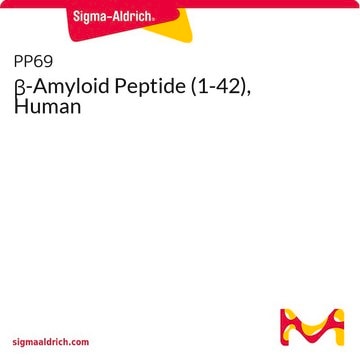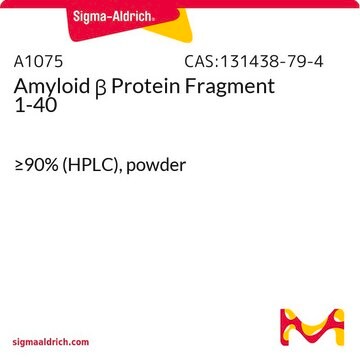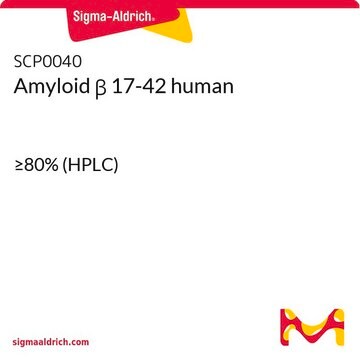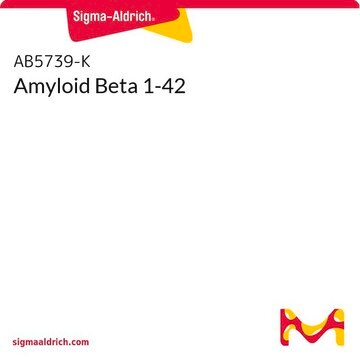All Photos(1)
About This Item
Empirical Formula (Hill Notation):
C36H67N9O9S1
Molecular Weight:
802.04
UNSPSC Code:
12352200
NACRES:
NA.32
Recommended Products
Assay
≥95% (HPLC)
form
lyophilized
composition
Peptide Content, ≥75%
storage condition
protect from light
storage temp.
−20°C
Amino Acid Sequence
Lys-Gly-Ala-Ile-Ile-Gly-Leu-Met
Application
Amyloid β (Aβ) refers to peptides derived from Amyloid precursor protein that vary in length from 36-43 amino acids. Aβ(s) peptides, their peptide fragments and mutated fragments are used to study a wide range of metabolic and regulatory functions including activation of kinases, regulation of cholesterol transport, function as a transcription factor, and regulators of inflammation. Aβ(s) peptides and their peptide fragments are also used to study oxidative stress, metal binding and mechanisms of protein cross-linking in the context of diseases such as Alzheimer′s disease and neurodegeneration.
Storage Class Code
11 - Combustible Solids
WGK
WGK 1
Flash Point(F)
Not applicable
Flash Point(C)
Not applicable
Choose from one of the most recent versions:
Certificates of Analysis (COA)
Lot/Batch Number
Don't see the Right Version?
If you require a particular version, you can look up a specific certificate by the Lot or Batch number.
Already Own This Product?
Find documentation for the products that you have recently purchased in the Document Library.
Sureshbabu Nagarajan et al.
Journal of structural biology, 170(3), 439-450 (2010-03-02)
Folding and self-assembly of amyloid beta (Abeta) peptide are linked to Alzheimer's disease. To understand the initial stage of amyloid-beta peptide aggregation, conformational characteristics of monomers of wild-type (WT) Abeta(28-35) and its mutant peptides A30G and A30I were investigated using
Sureshbabu Nagarajan et al.
The FEBS journal, 275(10), 2415-2427 (2008-04-22)
The interaction of the beta-amyloid peptide (Abeta) with neuronal membranes could play a key role in the pathogenesis of Alzheimer's disease. Recent studies have focused on the interactions of Abeta oligomers to explain the neuronal toxicity accompanying Alzheimer's disease. In
Our team of scientists has experience in all areas of research including Life Science, Material Science, Chemical Synthesis, Chromatography, Analytical and many others.
Contact Technical Service

![[Ala28]-Amyloid β 25-35 ≥95% (HPLC)](/deepweb/assets/sigmaaldrich/product/images/306/938/dd9f7c72-cfca-4ea3-8e10-a7a2a7994639/640/dd9f7c72-cfca-4ea3-8e10-a7a2a7994639.jpg)





![[Gln22]-Amyloid β 1-40 human ≥95% (HPLC)](/deepweb/assets/sigmaaldrich/product/images/707/874/59f84b84-17c2-494f-b2ae-4ca860b83976/640/59f84b84-17c2-494f-b2ae-4ca860b83976.jpg)
